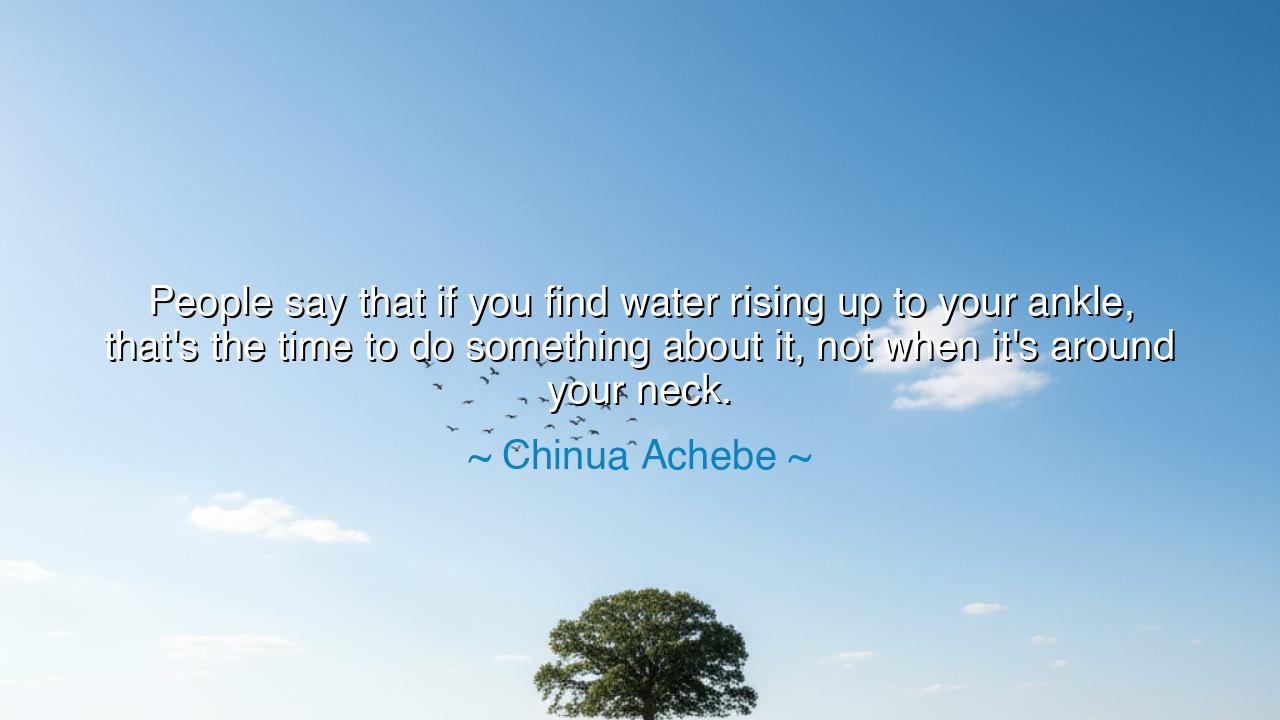
People say that if you find water rising up to your ankle
People say that if you find water rising up to your ankle, that's the time to do something about it, not when it's around your neck.






The great sage of Africa, Chinua Achebe, gave us a proverb that burns with timeless wisdom: “People say that if you find water rising up to your ankle, that’s the time to do something about it, not when it’s around your neck.” These words, drawn from the deep well of ancestral teaching, speak to the urgency of foresight, the discipline of vigilance, and the folly of delay. They remind us that calamity does not strike all at once—it creeps, it gathers, it rises like a tide—and the wise act before it engulfs them.
To see the water at the ankle is to notice the first signs of danger, the small beginnings of chaos, the whispers of a storm yet to roar. It is in those first moments that action is most powerful, most effective, most merciful. Yet men are often blind in such hours, laughing at the danger, saying, “It is only a little,” until the little becomes much, and the much becomes overwhelming. Achebe warns us: when the water reaches the neck, struggle is no longer wisdom but desperation, and what might have been prevented must now be endured.
History itself bears witness. Consider the fall of the Roman Empire. Long before the barbarians stormed its gates, the signs were plain: corruption within, division among the rulers, the decay of discipline, the growing burden of taxes, the erosion of virtue. These were the waters at the ankle. Yet many rulers looked away, thinking the empire eternal. By the time the invaders stood at Rome’s gates, the waters had risen to the neck, and no force could prevent the flood. Thus, the empire that had once ruled the known world fell, not because it lacked power, but because it lacked foresight.
This truth is not only for nations but for each soul. The quarrel left unresolved, the habit left unchecked, the injustice left unchallenged—these are waters at the ankle. If we do not act when the danger is small, we will be forced to suffer when it grows great. The one who ignores a spark may one day watch their house consumed in flame. The one who refuses to mend a crack in the wall may find the entire house collapsing. To live wisely is to respect the beginnings of trouble and to act before trouble becomes doom.
Yet Achebe’s words are not spoken to strike fear, but to awaken courage. For the truth is this: the smallest act of vigilance can prevent the greatest disaster. A word of kindness can end a quarrel before it hardens into hatred. A moment of discipline can break a habit before it becomes a chain. A small act of justice can prevent oppression before it spreads like poison. When we act early, we act with strength; when we act late, we act with desperation.
The lesson, then, is simple: be watchful. Do not despise the early signs of danger, whether in your own heart, in your home, or in your society. Train your eyes to see the ankle-deep waters and your spirit to move swiftly against them. For it is far easier to build a wall against a trickling stream than against a raging flood.
Practical action lies here: in every day, examine your life. Ask yourself, What small cracks do I see? What little floods are rising? Then act with courage, however small the action may seem. Repair the breach while it is narrow; mend the bond while it is tender; confront injustice while it is still weak. In this, you will live not as one drowning in panic, but as one walking in wisdom.
Thus, O children of tomorrow, carry Achebe’s proverb in your hearts: when the water is at your ankle, rise and act. For to delay is to invite ruin, but to act in time is to preserve life, honor, and hope. This is the way of the wise—swift to see, swifter to respond, and steadfast in guarding against the flood.






AAdministratorAdministrator
Welcome, honored guests. Please leave a comment, we will respond soon